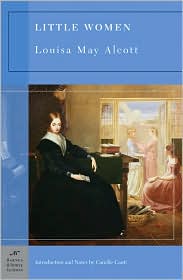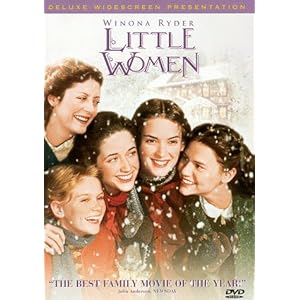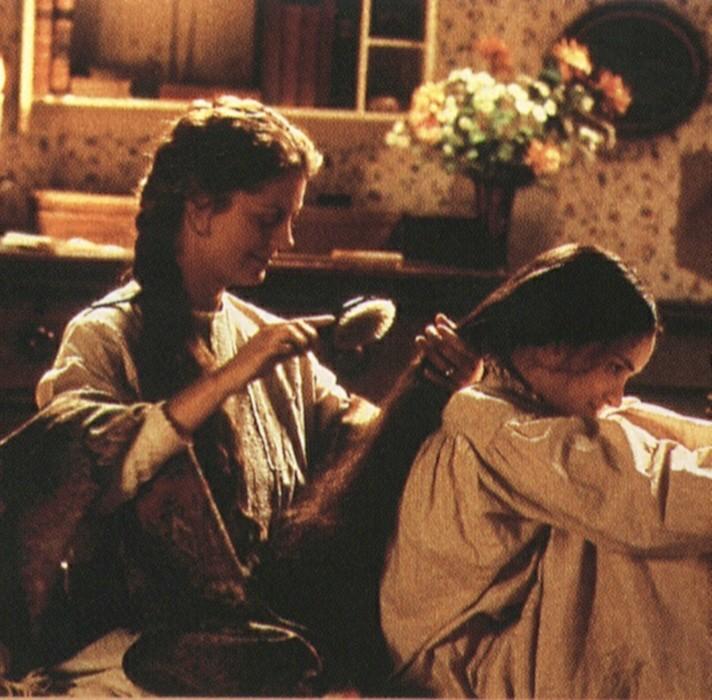 It's been ten years since I first read this book cover-to-cover; between then and now I've watched the 1994 film adaptation countless times and read "Little Women and Werewolves." I felt like a bit of a fraud before this second reading because I counted it as one of my all-time favorite books but only read it once. On the other hand, that's a credit to how much the story resonated with me.
It's been ten years since I first read this book cover-to-cover; between then and now I've watched the 1994 film adaptation countless times and read "Little Women and Werewolves." I felt like a bit of a fraud before this second reading because I counted it as one of my all-time favorite books but only read it once. On the other hand, that's a credit to how much the story resonated with me.Ten years ago this was the longest text I ever read on my own-- that was before the last four Harry Potter volumes were published. It was also the first book I ever read that didn't have a plot in the sense of the traditional children's lit. I was reading, and I was a little younger than the youngest of the main characters as she's presented at the beginning of the book. It's curious to read it over and find out that the book covers the same amount of time as the period between my first reading and last reading, and now I am the age of the oldest character at the end of the book.
I've seen the film version of this story so many times that even now when I think of the story of "Little Women" I refer to the events as they transpire in the film rather than the text. The 1994 adaptation is among my favorite films (I've never seen the one with Katharine Hepburn as Jo) and I'm happy to see how faithful it was to Louisa May Alcott's original story--
 the script even takes lines right out of the book. Meg, Jo, Beth and Amy are still very familiar to me, and knowing what happens to them in the end doesn't diminish what transpires between the first and last page. I now realize how much foreshadowing Alcott employs, hinting at significant events to come. Also, now that I know more about the author, it's easy to see how much of herself she puts into Jo, the writer, and all the little heartbreaks she sends Jo's way: Losing her older sister, Meg, to a husband; anticipating and turning down a proposal from her best friend, Laurie; losing Beth, her closest sister and companion; having her youngest sister Amy burn one of her manuscripts and eventually marry Laurie; and finally a unconventional romance with a German professor 20 years her senior.
the script even takes lines right out of the book. Meg, Jo, Beth and Amy are still very familiar to me, and knowing what happens to them in the end doesn't diminish what transpires between the first and last page. I now realize how much foreshadowing Alcott employs, hinting at significant events to come. Also, now that I know more about the author, it's easy to see how much of herself she puts into Jo, the writer, and all the little heartbreaks she sends Jo's way: Losing her older sister, Meg, to a husband; anticipating and turning down a proposal from her best friend, Laurie; losing Beth, her closest sister and companion; having her youngest sister Amy burn one of her manuscripts and eventually marry Laurie; and finally a unconventional romance with a German professor 20 years her senior.Then and now I empathize most with Jo, and I've always remembered this passage from the book:
 "November is the most disagreeable month in the whole year," said Margaret, standing at the window one dull afternoon, looking out at the frost-bitten garden.
"November is the most disagreeable month in the whole year," said Margaret, standing at the window one dull afternoon, looking out at the frost-bitten garden."That's the reason I was born in it," observed Jo pensively, quite unconscious of the blot on her nose.
I might be the only person who finds this little passage memorable, but it perfectly encapsulates the way I remember Jo and relate to her.
I don't think it's ever too late to read this book for the first time; it's a classic, after all, and definitely still holds up as a work by a woman for women of all ages. Well, anyone really, regardless of gender/gender identification. More accurate to say that women of all ages can appreciate what Louisa May Alcott created. As for "Little Women and Werewolves"... I think that's a topic for another post on another day.
I read 'Jane Eyre' two winter breaks ago. I thought it was the perfect book for December and January. The descriptions of winter in England, the every evening by a roaring fireplace, the bare trees outside... perfect. Have you read it? I've not read Little Women...
ReplyDeleteHaven't read "Jane Eyre" yet, but now I'm planning to do so as soon as I finish the one I'm reading now. "Little Women" is also a perfect book to read in the winter.
ReplyDelete